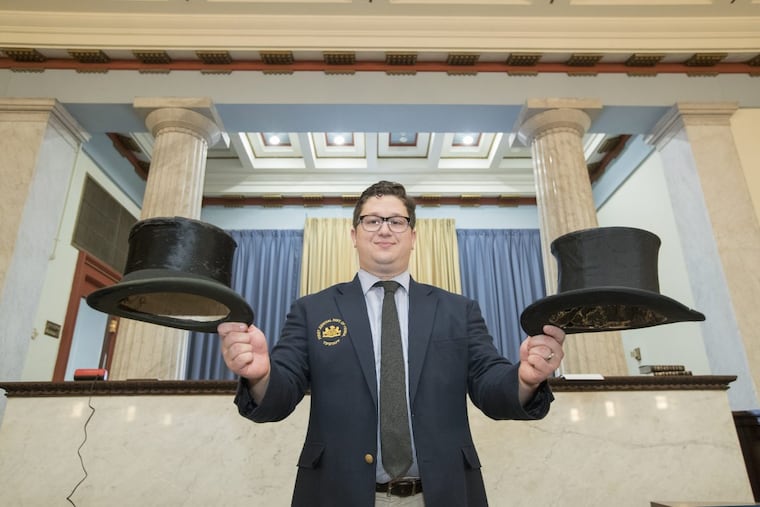Judges will vote, via top hat, for interim DA
By tradition, the 88-member Board of Judges will vote Thursday for an interim Philadelphia district attorney by placing ballots in a battered old top hat. The hat's origin, like the rest of the process, is shrouded in mystery.

There is more mystery than magic when it comes to the Philadelphia Board of Judges selecting a new district attorney — even if the names are pulled from a top hat.
The 88 judges of the Court of Common Pleas will gather Wednesday afternoon in City Hall to hear presentations from 14 candidates seeking to serve 5½ months as the interim district attorney. The judges will vote Thursday.
Both meetings are closed to the public. The vote will be by secret ballot. By tradition, the judges will cast that ballot by dropping a slip of paper into a battered old top hat.
Even the hat is shrouded in mystery. There are at least two origin stories. And that makes sense because there are really two top hats hanging around City Hall for just such an occasion.
The hat expected to be employed Thursday — in just slightly better condition — is a Dunlap & Co. silk hat marked inside as being sold in Harrisburg. The backup top hat hails from Thackeray & Elliott, which once had a store at 808 Chestnut St.
Judge Ann Butchart, who serves as secretary for the Board of Judges, said the court's archive holds very little information about the hats.
Retired President Judge Edward J. Bradley said one of the hats may have belonged to the late Vincent A. Carroll, who was named the first president judge of the court in 1968.
Carroll was among the founders in 1952 of the city's official St. Patrick's Day Parade. The 2012 book Irish Philadelphia features a cover picture of Carroll leading the parade in the 1950s as grand marshal, doffing a top hat.
Retired Judge Mark Bernstein, who also served as secretary to the Board of Judges, said one of the hats might have belonged to the late Adrian Bonnelly, who served as Municipal Court president judge.
An Inquirer story in May 1958 described Bonnelly as sporting a top hat on "Old Newsboy's Day," a charity fund-raiser.
The names going into one of those hats Thursday include a former DA, Lynne Abraham; two current top staffers in the office, Kathleen Martin and John Delaney; one candidate who ran for the office in this year's Democratic primary election, Joe Khan; three retired judges, Ben Lerner, William Manfredi, and Paul Panepinto; one senior judge, D. Webster Keogh; five former prosecutors, Kelley Hodge, Robert A. Rovner, Curtis Douglas, Arlene Fisk, and James Berardinelli; and one longtime defense attorney, Leon Aristotle Williams.
The post is vacant because former District Attorney Seth Williams resigned last month during his trial on federal corruption charges, just before pleading guilty to one count of bribery. Williams, now held in the Federal Detention Center, will be sentenced in October.
It has been 26 years since the Board of Judges last voted for a district attorney. That pitched battle in 1991 pitted two Common Pleas Court judges against each other. Abraham won in a 39-37 vote, defeating Russell Nigro, who went on to serve as a state Supreme Court justice.
Nigro this week said his political connection to former State Sen. Vincent Fumo was among the factors that led to his 1991 defeat.
"You have a lot of backroom stuff going on — who likes this person, who doesn't like that person," Nigro said. "You have different elements in the equation. It's not necessarily the most qualified person."
Abraham's candidacy has provoked controversy. Rodney Muhammad, president of the NAACP in Philadelphia and a Nation of Islam minister, denounced Abraham on Sunday as a "menace to society," in part because of her efforts two decades ago to derail the nomination of Judge Frederica Massiah-Jackson to a federal judgeship.
Massiah-Jackson, now the longest-serving Common Pleas Court judge, is chairwoman of a three-judge panel picked to review and recommend candidates to the Board of Judges, provoking a sense of political karma around the process.
Abraham has said she expects Massiah-Jackson will judge her fairly. Massiah-Jackson has said she'll vote for the best candidate.
The Board of Judges, as befitting a relatively obscure body, also votes to appoint members of other relatively obscure boards, including the Board of Revision of Taxes, the Board of Viewers, the Board of Directors of City Trusts, the Glen Mills School Board, the Auditors of Corporate Sureties and Fiduciaries, Jury Commissioner, and the Appointment of Counsel in Criminal Cases Screening Committee.
The 88 judges are about evenly split in tenure — 45 of them have served 10 or more years on the bench while 43 have less than 10 years of service. Women outnumber men, 47 to 41. Minorities make up 44 percent of the judges, with 32 African Americans, five Hispanics, and two Asians.
Despite the jockeying, intrigue, and controversy, Nigro this week said he was "perplexed" as to why any of the candidates want the interim post and why the Board of Judges is bothering to hold a vote at all.
A new district attorney will be elected in the Nov. 7 general election and take office in the first week of January.
"I don't quite understand it, why they're going down this road," Nigro said of the interim post. "No matter who gets elected, what are they going to do? They're not going to be able to set policy, because they're not going to have enough time."